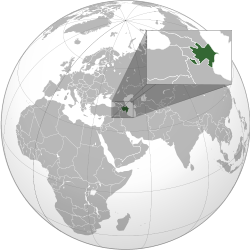Azerbaijan: Ramil Safarov And The Making Of An Anti-Hero
By Eurasianet
By Shahin Abbasov
When Azerbaijani President Ilham Aliyev pardoned then-Lt. Ramil Safarov last summer for his 2004 slaying of an Armenian junior officer, Baku was initially defiant in the face of international criticism. But defiance has given way to reticence in recent weeks.
Since Safarov’s pardon, the debates within Azerbaijan about whether or not “we did everything correctly” have not died down. And Safarov, once the official toast of Azerbaijan, has turned into an anti-hero virtually overnight.

Once fêted with flowers, given a promotion and a new Baku apartment, Safarov now seems like a wayward relative, tolerated for the sake of family honor, but no longer praised among friends and neighbors. Officials no longer tout his patriotism, and he has become a non-person in the eyes of pro-government media.
Maj. Safarov himself does not grant interviews, or make public appearances. His expected job at a Ministry of Defense training center in Baku is not known to have begun; perhaps because of concerns about Armenian revenge attacks.
The government has not commented on its sudden cold-shouldering of Safarov, but Baku-based political analyst Elhan Shahinoglu believes that international and domestic criticism of Azerbaijan’s handling of the matter prompted the government to change course. “Of course, Safarov will not be returned to prison, or sent back to Hungary, but he will not be presented as a national hero anymore,” Shahinoglu said.
That stance could be seen in the circumspect media coverage of the Parliamentary Assembly of the Council of Europe’s October 5 session, an event at which Azerbaijan’s pardon of Safarov came up for discussion.
In the days after the pardon, Aliyev bristled at outside criticism. The Azerbaijani president took particular issue with criticism from the Council of Europe’s Norwegian secretary general, Thorbjørn Jagland, asking if it was “admissible” for Norway to have sentenced Anders Behring Breivik to only 21 years in prison for the murder of 81 people in 2011.
Contrary to perceptions abroad, the government has faced ongoing domestic criticism for its “glorification” of Safarov. No opinion polls have been conducted on the topic, but one recent survey on the popular news site Contact.az showed that 52 percent of 584 self-selected users condemned Safarov’s release from prison.
In a September 26 statement, the Public Council on Karabakh (PCK), a non-registered Baku-based group made up of about 30 prominent political analysts, human rights defenders and mostly pro-opposition politicians termed the government’s handling of Safarov’s case “inadmissible and wrong.”
“It harms Azerbaijan’s image,” the statement read. “It also seriously harms the legal and moral guidelines for the younger generation.”
One of the most widely circulated criticisms of the government’s policy was a September 6 opinion piece from the Kultura.az portal, written by Rahman Badalov, a Baku-based political analyst. The glorification of Safarov is “an insult to the memory of the real heroes who died in [the] Karabakh” conflict, Badalov wrote.
Eldar Namazov — a former presidential aide to the late president Heydar Aliyev, and currently a leader of the opposition group, For the Sake of Azerbaijan Public Forum – said a court should have handled the matter of a pardon for Safarov, not the president. “[T]he government, by its immediate pardon, took a clearly political decision, which was criticized internationally,” Namazov explained.
Of late, international criticism has faded, in large part because of geopolitical factors. In particular, the United States and the European Union don’t want to alienate Azerbaijan, given the ongoing crisis with Baku’s southern neighbor, Iran, over Tehran’s nuclear program.
It’s not surprising, then, that newly arrived US Ambassador Richard Morningstar did not touch on the Safarov matter during his first news conference on September 28, and, similarly, PACE, usually an outspoken critic of Azerbaijan, discussed Safarov on October 5 without offering official condemnation.
For now, the conclusion appears unanimous: some things are better left unsaid.
Shahin Abbasov is a freelance reporter based in Baku.

Moreover, in one idiotic act, Azerbaijan simultaneously severely compromised their negotiating position and magnified the Karabakh Armenian claim that they can never live under Azerbaijani domination.